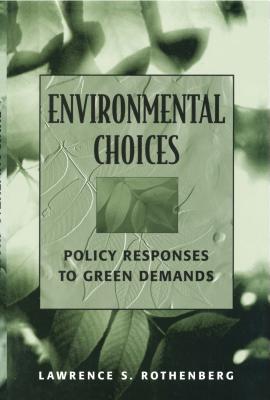Within a federal system, government agencies and regulatory policies can be fractured -- even at odds with each other. National actors share power with their counterparts in states and localities, as do presidents with Congressional leaders, and bureaucrats with judges. Understanding the broad economic and political contexts of environmental policymaking illuminates the motivations behind policy choices of various interested parties, from the National Park Service and the EPA to environmental activists and members of Congress. Rothenberg utilizes basic economic ideas to provide, not only a fresh look at how the U.S. deals with environmental ills, but a way of thinking about policy making in general.
| FindBook |
有 1 項符合
Environmental Choices: Policy Responses to Green Demands的圖書 |
 |
Environmental Choices: Policy Responses to Green Demands 作者:Rothenberg 出版社:CQ Press 出版日期:2002-02-01 語言:英文 規格:平裝 / 225頁 / 22.6 x 15 x 1.8 cm / 普通級/ 初版 |
| 圖書館借閱 |
| 國家圖書館 | 全國圖書書目資訊網 | 國立公共資訊圖書館 | 電子書服務平台 | MetaCat 跨館整合查詢 |
| 臺北市立圖書館 | 新北市立圖書館 | 基隆市公共圖書館 | 桃園市立圖書館 | 新竹縣公共圖書館 |
| 苗栗縣立圖書館 | 臺中市立圖書館 | 彰化縣公共圖書館 | 南投縣文化局 | 雲林縣公共圖書館 |
| 嘉義縣圖書館 | 臺南市立圖書館 | 高雄市立圖書館 | 屏東縣公共圖書館 | 宜蘭縣公共圖書館 |
| 花蓮縣文化局 | 臺東縣文化處 |
|
|
圖書介紹 - 資料來源:博客來 評分:
圖書名稱:Environmental Choices: Policy Responses to Green Demands
|











